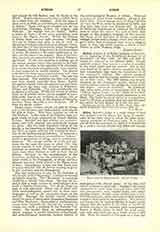

Athias, JOSEPH, b. in Spain, probably in Cordova, at the beginning of the seventeenth century; d. at Amsterdam, May 12, 1700. In 1661 and 1667 he issued two editions of the Hebrew Bible. Though carefully printed, they contain a number of mistakes in the vowel points and the accents. But as they were based on the earlier editions compared with the best manuscripts, they were the foundation of all the subsequent editions. The copious marginal notes added by Jean de Leusden, professor at Utrecht, are of little value. The 1667 edition was bitterly attacked by the Protestant savant, Samuel Desmarets; Athias answered the charges in a work whose title begins: “Caeus de coloribus”. He published, also, some other works of importance, such as the “Tikkun Sepher Torah“, or the “Order of the Book of the Law“, and a Judo-German translation of the Bible. The latter involved Athias in a competition with Uri Phoebus, a question that has been discussed but cannot be fully cleared up at this late date.
A.J. MASS

